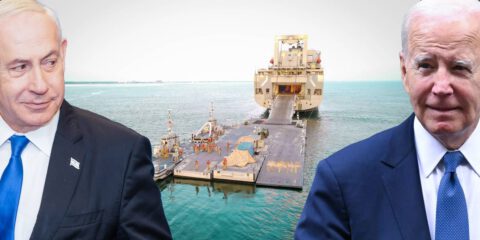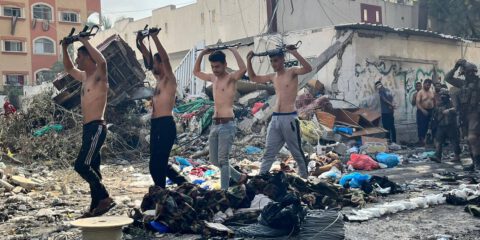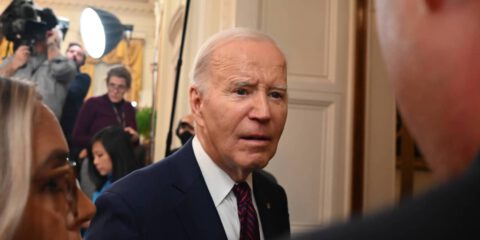The US should explore other sites for its military base in Qatar while pressing demands related to Hamas
The Hamas slaughter of civilians on October 7 puts the Gulf state of Qatar, which funds and hosts Hamas leadership, under new scrutiny. There is a way out for Qatar, but first, let us understand how Qatar arrived at this uncomfortable situation.
Qatar’s vision of itself – an international entrepôt open to all – is shared to some extent by all six Arab states of the Gulf. In general, US policy toward these states has encouraged such openness both on human rights grounds and as a way of diversifying their economies away from total reliance on raw resource exports.
However, there is a dark side to this policy of openness that allows the political arms of terror organizations to reside and flourish on one’s soil. For years, America and the West have not objected to this aspect of Qatar’s policy. It was even seen sometimes as beneficial. For instance, Qatar became the channel for American talks with the Taliban throughout the American occupation of Afghanistan and continues today. Qatar hosted the Afghan Taliban after they were removed from power in Kabul.
However, Qatar’s hosting of Hamas now is another matter. Hamas’ barbaric murders will change many things in the Middle East, and one of them must be Qatar’s – and the Gulf’s – funding of Muslim fundamentalist terrorist organizations.
Qatar should get ahead of what is coming by deporting the political leadership of Hamas, stopping all official funding for Hamas, and freezing accounts of terror organizations in its banking system.
This kind of 180-degree policy shift is easier said than done. The US and Israel must start by admitting their failure to comprehend and react to the clear and present danger that Hamas poses. American and Israeli officials – not just Qataris – acted on the belief that Hamas was normalizing over time as the functioning government of the Gaza Strip.
The world changed on October 7, yet the Qatari ruling elite believes it can control the Muslim Brotherhood and sees it as a tool for expanding Qatari influence. However, the MB could turn on the Al Thani after swinging enough of the Qataris to their worldview. The good news is this: despite our collective failure to date, the world has now been jolted awake by the ever-present danger. Qatar, a sharp and nimble player on the world stage, should react sooner rather than later.
In every policy discussion of Qatar, the “elephant in the room” is the Al Udeid airbase, the largest US military base in the Middle East, which the Qataris built to US specifications at their cost and which they maintain at their expense. It is an essential aspect of US power projection throughout the Middle East and beyond, alongside the US Sixth Fleet headquartered in Bahrain and the US Army base in Kuwait. The Washington consensus posits that there are no readily available alternatives to Al Udeid, and thus, US policy has become hostage to whatever Qatar wants to do. So good luck, Washington friends say, encouraging Qatar to do hard things like deport Ismail Haniyeh of Hamas and freeze his bank accounts. The Qataris should, but they will not.
The Washington consensus may be wrong about Qatar in the post-October 7 world.
First, Qatar’s rulers, especially Emir Tamim ibn Hamad Al Thani, are sensible realists, not ideologues or Muslim Brotherhood adherents. The emir showed his pragmatism regarding Qatar’s relationship with another terrorist group – Lebanon’s Hezbollah. After the Second Lebanon War in 2006, Qatar helped fund Hezbollah as part of its effort to reconstruct Lebanon. It was felt at the time that Hezbollah could be normalized through engagement. That optimistic view turned out to be wrong, and the current emir reversed policy and stopped funding the Lebanese Shia Islamist political party.
Qatar showed its pragmatism again this week, according to news reports, by agreeing informally with the US Treasury not to release any of the $6 billion of Iranian oil revenue held by Qatar.
Second, in this post-October 7 world, Hamas not only murdered hundreds of Israelis but also 29 Americans and is holding others hostage. Its political leaders broadcast threats from Qatar, and its former leader now calls for attacks on Americans.
America is not the only beneficiary of the Al Udeid base – Qatar receives a significant US military presence, an effective security blanket. While the US does not have to withdraw from the base immediately, it should, as a planning measure, initiate talks with both the UAE and Saudi Arabia – both of which, during their recent embargo of Qatar, offered to host the US Air Force in lieu of using Al Udeid. Those offers may have been idle talk, but talks on where to place US military bases are run out of the State Department, not the Pentagon, which helps ensure good foreign policy and military policy coordination. The US should allow airbase talks to start and see where they lead while Washington raises the Hamas demands of Qatar.
The essence of good diplomacy is persuading allies and security partners to do the hard things that are of mutual interest. While the war with Hamas is fresh, the US should act now to cut off its foreign sources of support while Israel does the hard work on the ground in Gaza.
A US security partner in the Gulf for decades, Qatar certainly does not want to become a state sponsor of terrorism. Its supporters in Washington realize this and are urging Doha to get rid of the now-toxic Hamas presence. Changing policy on Hamas is the right thing for Qatar and the world.
A longer version of this article was published in The National Interest.
JISS Policy Papers are published through the generosity of the Greg Rosshandler Family.
Photo: IMAGO / ZUMA Wire / Chuck Kennedy / State Department








 - בניית אתרים
- בניית אתרים